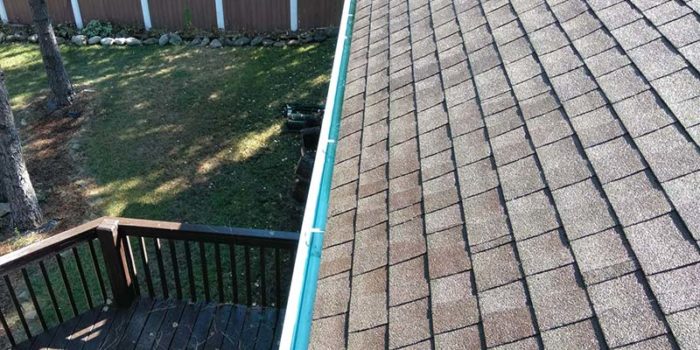It’s easy to forget all about gutter cleaning. But clean gutters and downspouts are essential to preventing damage to both the exterior and interior of your home. Gutter cleaning prevents buildup and clogs that can lead to standing pools of water, the spread of moss and lichen, and potential flooding. Annual gutter cleaning by a professional pressure washing service can ensure the long life and health of both your gutters and your home.
Why You Need to Clean Your Gutters
Gutters won’t clean themselves. They get clogged with debris like fallen leaves, twigs and branches, gunk and grime, and all manner of organic material. Some of this buildup will get washed away in a hard rain, but much of it remains in your gutters, creating logjams in your downspouts that lead to standing water and the growth of moss, mildew and lichen.
Proper gutter cleaning removes all of this debris and allows your gutters and downspouts to function as they were intended to. Remember, the main purpose of your gutters and downspouts is to direct water flow away from your home. Gutter cleaning ensures that water flow isn’t impeded.
Gutter cleaning prevents:
- Poor rainwater runoff
- Standing water along the sides of your home and on your roof
- Basement level flooding due to poor runoff
- Spread of moss and algae growth due to standing water
- Wood rot
- Standing water leaking into the interior structure of your home
How Often Should You Clean Your Gutters?
Gutter cleaning should be done at least once a year. In areas like the Pacific Northwest, especially in Eastern Washington and Idaho, it is recommended that homeowners conduct gutter cleaning twice a year. Unlike the coastal regions, the Inland Northwest experiences far greater amounts of falling leaves and other debris that can clog your gutters and downspouts.
Gutter cleaning should be done in the fall after trees have shed their leaves, and again in the spring before heavy rains begin. By removing debris during the fall, when buildup is heaviest, and again after the snow has melted away at the end of winter, you can ensure that your gutters and downspouts will function properly throughout the year.
Homeowners with lots of trees in their yard or who live in a heavily forested area should consider more frequent gutter cleaning, perhaps as often as four times a year.
What Does Gutter Cleaning Cost?
Gutter cleaning generally costs between $25 and $75 for residential homes. Different professional gutter cleaning services charge different rates. The overall charge depends upon the size of your home, the number of gutters along your house, and the pitch of your roof.
Bigger homes with more gutters and steeply slanted roofs require more time and effort for effective gutter cleaning, and thus they will cost more.
Why Hire a Professional Gutter Cleaning Service
Many homeowners are determined to clean their gutters themselves. A respectable job can be done by the average homeowner, but for the best results it is better to hire a professional gutter cleaning service.
Professional gutter cleaning services have higher-quality equipment than what most homeowners can bring to the job, even when renting equipment from local rental outlets. In addition to professional equipment, a pro gutter cleaning service will have a full range of environmentally-friendly cleaning supplies that will kill moss, mildew, algae and lichen without damaging your home or hurting your surrounding greenspace.
Gutter cleaning pros also have years of knowledge and experience in understanding exactly what is necessary to get the job done without damaging your home. Many homeowners make the mistake of choosing the wrong equipment and improper cleaning products, the end result of which is destruction to the very home they are trying to protect.
DIY Gutter Cleaning: Pro Tips
- Cleaning gutters from a ladder is safer than on top of your roof
- Use work gloves
- Search for loose nails/screws and reattach them as needed
- Look for holes and leaks and seal them properly
- When sealing leaks, be sure not to create bumps that will lead to blockages and buildup
- Be aware of powerlines
- Don’t forget to fully clean gutter guards and screens
- Clear debris from the bottom of downspouts to prevent blockages and buildups

